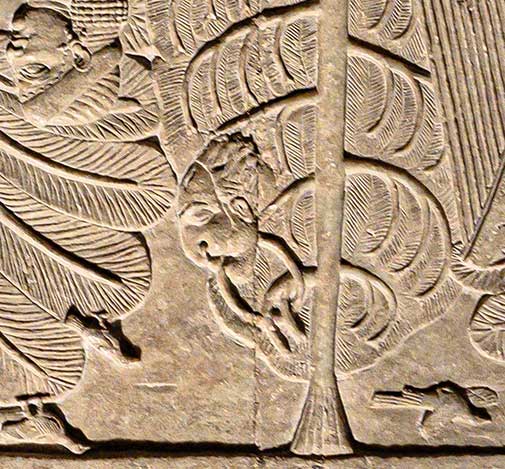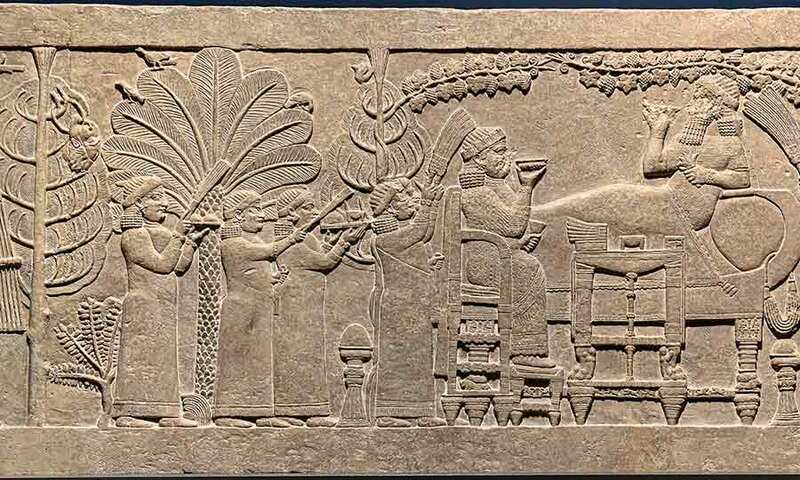On this day three years ago, I blogged about Psalm 23 from the perspective of ancient Near Eastern studies and my personal battle with the enemy of cancer. My augmented comments today are offered as a second pass over this familiar psalm as all kinds of âenemiesâ remain in my plain sight in this broken world. As I continue reflecting on Psalm 23 from the vantage point of remission and as my Royal Shepherd continues refreshing me (vv. 1-3), I appreciate both how God provides for me âin full view of my enemiesâ (NJPS) and that Godâs comforting presence is the reason to ânot fear harmâ or even death in the âvalleyâ (vv. 4-6). Specifically, I want to expand on two aspects of Psalm 23: the ancient Near Eastern background of royal meals and the literary structure which centers on Godâs presence.
.jpg)
First, the Shepherd-King sustains us on lifeâs journey as he prepares our tables, anoints our heads, and overfills our cups (v. 5). When we consider royal feasting and royal provisions in the ancient Near Eastern cognitive environment, we can appreciate the poignant imagery in this psalm. In the palace relief showing Ashurbanipalâs feast (see above), we see the Neo-Assyrian king and queen enjoying food and drink â with extravagant service! â after defeating their political enemy whose severed head hangs upside down from a distant pine tree (see flipped detail) [1].
Janling Fu explains: âThe close relationship between war and peace, victory and post-victory banquet â essentially the association of the banquet with judgment â is repeatedly seen in these episodes and further reflected in the Hebrew Bible. A motif of judgment appears prominently with the idea of a king with a cupâ [2]. This aids our understanding of Psalm 23:5 where the divine King ironically serves, oils, and blesses the psalmist (or us, as we identify with the psalmist) with royal refreshments in view of his (or our) disempowered enemies [3].

In a study on Old Babylonian and Neo-Assyrian texts in For Us, but Not to Us, we also learn illuminating background about royal rations issued to troops on life-threatening missions [4]. Adam Miglio proposes that âPsalm 23:5a ⊠employs imagery taken from the Near Eastern practice in which kings furnished foodstuffs to their dependents âon the road,ââ and he considers âhow such royal provisions were meals of symbolic significance that not only served to sponsor palace dependents but also to broadcast royal largessâ [5]. Using these well-known cultural images from ancient royal patronage, Psalm 23:6 tangibly reminds us how Godâs áčĂŽv and áž„eČő±đ»ć (âgoodness/orderâ and âloyaltyâ) pursue us in all kinds of hostile environments where our lives or livelihoods are threatened. Time after time, we personally receive Godâs gracious provisions â sometimes magnanimous public displays â despite the persistent âenemiesâ of disabling injuries, wasting diseases and encroaching death. Through it all and to the end, the Shepherd-King remains our good and loyal Caregiver [6].
Second, Godâs presence is the main subject of this Psalm. âFor you are with meâ (°ìĂź-âattĂą âimmadĂź) is the reason why âI will not fearâ in v. 4. As mentioned in my previous post, this God-with-us revelation is at the literary center of the psalm. We know this by grammatical shift: God is in third person in vv. 1-4a, and God is in second person in vv. 4b-6. We also know this by word-count in the Hebrew text: the central pivot is the conjunction °ìĂź, âfor/becauseâ (°ìĂź is the twenty-ninth out of the fifty-seven total words in Psalm 23) [7]. Furthermore, we observe that the divine name YHWH, which stands for Godâs presence, encases the psalm in a figurative frame known as inclusio: YHWH is found in vv. 1 and 6 (occurring as the third word from the beginning and as the third word from the end in the Hebrew text). Because God is positioned prominently at both the center and the periphery of Psalm 23 (see table), we can perceive that God is preeminent everywhere in our dependent lives (cf. Col 1:15-20) [8].
The âwith meâ affirmation in v. 4 orients us as sheep in Godâs pasture or as dependents in his kingdom. Kenneth Bailey, who recognizes the YHWH-framework and the turning-point of the psalm, explains that âSheep have a special problem. They have no defenses ⊠The sheepâs only security is the shepherdâ [9]. The Shepherdâs presence will either protect us from possible harm and death or encourage us to trust God through inevitable harm and death. God himself is the Sovereign Resource who leads us (vv. 1-3) [10], comforts us (v. 4), hosts us (v. 5), and pursues us so that we can enjoy the blessed hope of returning to (or dwelling with) him for long days (v. 6).
The metaphor that God is our Good Shepherd and that we are sheep in the pasture of his presence along with the metaphor that our Royal Host lavishly provisions us in hostile environments are both reinforced in the New Testament (Matt 9:36; Mark 6:34; Luke 22:14-30; John 10:1-18; 14:1-4; Eph. 6:10-12; 1 Tim. 6:17; Heb. 13:20-21; 1 Pet. 2:25; 5:4; Rev. 7:15-17; 19:6-21) and in our lived experience with God. My wife and I can personally testify about Godâs extravagant gifts during times of significant need, trouble or loss. When various âenemiesâ (or our worries about them) threaten to undo us or when mortal ills prevail, our Helper is present amid the flood and he provides exactly what we need (cf. Ps. 46), often by prompting his people to give generously of their resources and time. When we think that we are surrounded by enemies (physical or metaphysical), we find that we are in fact surrounded by YHWH, our Shepherd-King. We are also learning that this kind of help from God strengthens us in lifeâs valleys so that we can encourage others who face similar challenges in the future (2 Cor. 1:3-7; cf. John 13:34; Eph. 5:1-2; 1 Tim. 6:17-19). This lesson may give us a glimpse into some of Godâs purposeful work in our pain (Gen. 50:20; Judg. 14:4; John 9:3; Rom. 8:18, 28; 2 Cor. 4:17; Jas 1:2-4). Hallelujah!
Notes
[1] For the relief and commentary, see Gareth Brereton, ed. I Am Ashurbanipal: King of the World, King of Assyria (London: Thames & Hudson/The British Museum, 2018) 50-51, 256-270.
[2] See Janling Fu, âFeasting in the Biblical Worldâ in Behind the Scenes of the Old Testament: Cultural, Social, and Historical Contexts, eds. Jonathan S. Greer, John W. Hilber, and John H. Walton (Grand Rapids: Baker Academic, 2018) 467.
[3] For this reversal as it relates to anointing, see Othmar Keel, The Symbolism of the Biblical World: Ancient Near Eastern Iconography and the Book of Psalms (Winona Lake: Eisenbrauns, 1997) 275.
[4] See Adam E. Miglio, âMetaphor and Meaning in Psalm 23: Provisions for âa Table in the Presence of My Enemiesââ in For Us, but Not to Us: Essays on Creation, Covenant, and Context in Honor of John H. Walton, eds. A. E. Miglio, C. A. Reeder, J. T. Walton, and K. C. Way (Eugene: Pickwick, 2020) 245-253.
[5] Miglio, âMetaphor and Meaning in Psalm 23,â 246 (Note: âlargess/largesseâ simply means generosity).
[6] For âYahweh as a magnanimous hostâ and hospitalityâs entailments for well-being, eating and drinking, anointing, guidance, escort, protection, and reputation, see Keel, Symbolism, 195-198, 335.
[7] My word-count analysis yields the same result as Fokkelmanâs poetic analysis in which °ìĂź-âattĂą âimmadĂź is the tenth colon out of twenty total cola in Psalm 23; cf. J. P. Fokkelman, The Psalms in Form: The Hebrew Psalter in its Poetic Shape (Leiden: Deo Publishing, 2002) 34.
[8] See helpful comments in Richard S. Briggs, The Lord Is My Shepherd: Psalm 23 for the Life of the Church (Grand Rapids: Baker, 2021) 122, 165.
[9] Kenneth E. Bailey, The Good Shepherd: A Thousand-Year Journey from Psalm 23 to the New Testament (Downers Grove: IVP Academic, 2014) 33, 49 (italics are Baileyâs).
[10] Cf. Ps 5:9; 27:11; 31:4; 78:72; 143:10; Ezek. 34:14-16, 31.
 șÚĘźÊÓÆ”
șÚĘźÊÓÆ”

.jpg)


